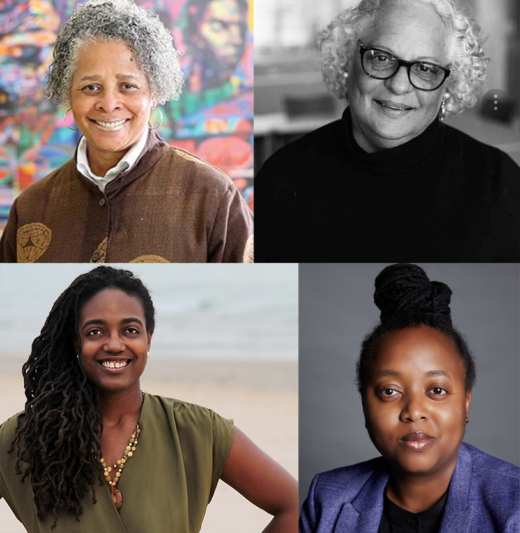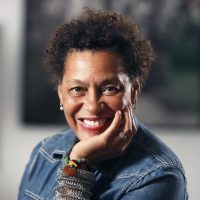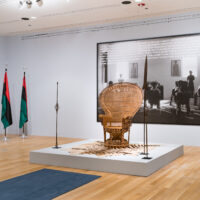Black Radical Pedagogy in Chicago

Part II in a Series of Programs Focusing on Themes of Black Radical Pedagogy
Join co-founder of New Concept and Betty Shabazz Schools and past president of American Educational Research Association Dr. Carol Lee aka Safisha Madhubuti; founding executive director of the Chicago Sexual Assault Services Network, director of Youth Services (YSP) and former member of the Black Panther Party (BPP) Mary Scott-Boria; director of wellness, culture and action, Chicago Freedom School Jacqulyn Hamilton; and principal at Village Leadership Academy Dayo Harris for a conversation with a group of Black women who have made important contributions to the educational landscape of Chicago through their work in radical teaching, leadership and organizing. Moderated by Crown Family School Senior Lecturer and the director of the Master of Arts in Social Work and Social Welfare program Lisa Lynelle Moore, PhD, LICSW.
FREE, open to the public. Please register for the webinar link.
This programs is co-presented by Logan Center Exhibitions, the Center for the Study of Race, Politics and Culture at the University of Chicago, and Logan Center Community Arts.
Program video
About the panelists
Mary Scott-Boria, a lifelong resident of Chicago, arrived here at age fifteen and immediately became immersed in the Chicago Freedom Movement as a young activist. After graduating from high school she joined the Black Panther Party, later working with the Puerto Rican Socialist Party, the Committee to End Sterilization Abuse, and several other social justice causes. She was also active in the anti-apartheid movement in Chicago and visited South Africa after the release of Nelson Mandela as organizing for post-apartheid elections was happening. She has also traveled to Palestine, leading a delegation there on two occasions. Scott-Boria is a graduate of Jane Addams Graduate School of Social Work at the University of Illinois Chicago and McCormick Theological Seminary and has over fifty years of experience and knowledge of Chicago’s communities, having worked as a social worker and human services administrator at several non-profit organizations. Her work and interests have been in women’s and youth issues and in community organizing and politics, with a deep commitment to anti-racist education and organizing. Most recently she directed the Urban Studies Program at Associated Colleges of the Midwest, where undergraduate students from across the US and abroad spend summers learning about social justice issues in urban communities, connecting with social and political landscapes locally and abroad.
Carol D. Lee, PhD is Professor Emeritus (the former Edwina S. Tarry Professor) of Education in the School of Education and Social Policy and in African-American Studies at Northwestern University, Evanston, Illinois. Over the course of her forty-nine-year career in education, Dr. Lee taught as an English language arts teacher at the high school and community college levels, a primary grade teacher, and a university professor. She is a founder of four African-centered schools and institutions, including three Betty Shabazz International Charter Schools (est. 1998) where she serves as chair of the board of directors. She is the author or co-editor of three books, the most recent of which is titled Culture, Literacy and Learning: Taking Bloom in the Midst of the Whirlwind, and four monographs, and she has published over 108 journal articles and book or handbook chapters in the field of education. She is a member of the National Academy of Education and the American Academy of Arts and Sciences, a fellow of the American Educational Research Association and the National Council on Research in Language and Literacy, a member of the Reading Hall of Fame, and a former fellow at the Center for Advanced Study in the Behavioral Sciences at Stanford University. She has been widely recognized and honored for her years of research, service, mentorship, and social activism, receiving the Distinguished Service Award from the National Council of Teachers of English, the Scholars of Color Distinguished Scholar Award from the American Educational Research Association, The President’s Pacesetters Award from the American Association of Blacks in Higher Education, the Lifetime Achievement Award from the American Association of Colleges of Teacher Education, an honorary doctorate from the University of Pretoria, South Africa, and many more.
M. Ekundayo (Dayo) Harris is the principal of Village Leadership Academy (VLA), an independent, private K-8 social justice school in Chicago that places an emphasis on liberatory education and transformative learning experiences through its social justice curriculum, its Grassroots Campaign projects, and its World Scholars Program. Harris is a Teach for America alum with over ten years of experience in the profession and an extensive background in culturally responsive teaching, curriculum design and instruction, and educational leadership. She has provided strategic education consulting for administrative teams and school sites across Chicago and remains committed to addressing educational equity and the eradication of the school-to-prison pipeline. Harris received her EdM in curriculum and instruction from the University of Illinois Chicago and her BA from Smith College, Northampton, Massachusetts, where she received both the Unity Award and the Juliet Evans Nelson Award for her contributions to the college. She is a proud board member of Sisters in Cinema, a nonprofit organization with an inclusive mission to entertain, educate, develop, and celebrate Black girls and women media-makers and future generations of storytellers and their audiences.
Jacqulyn Hamilton lives her work. She blends theory and practice to address the social and institutional impact of power and oppression on our physical, emotional, and political bodies. Her work prioritizes the intersections where politics, policy, identity, and institutions meet. She draws on her background in political theory, grassroots organizing, strategy, popular education, and healing justice to support others as they become agents for their own physical, political, and emotional wellness. Though she is a seasoned facilitator, youth advocate, and post-secondary school educator, you may also find her in private practice as a licensed massage therapist. A proud daughter of Chicago’s West Side, she carries the lessons and values her community has taught her as she travels to teach and learn about African diasporic technologies and traditions.


